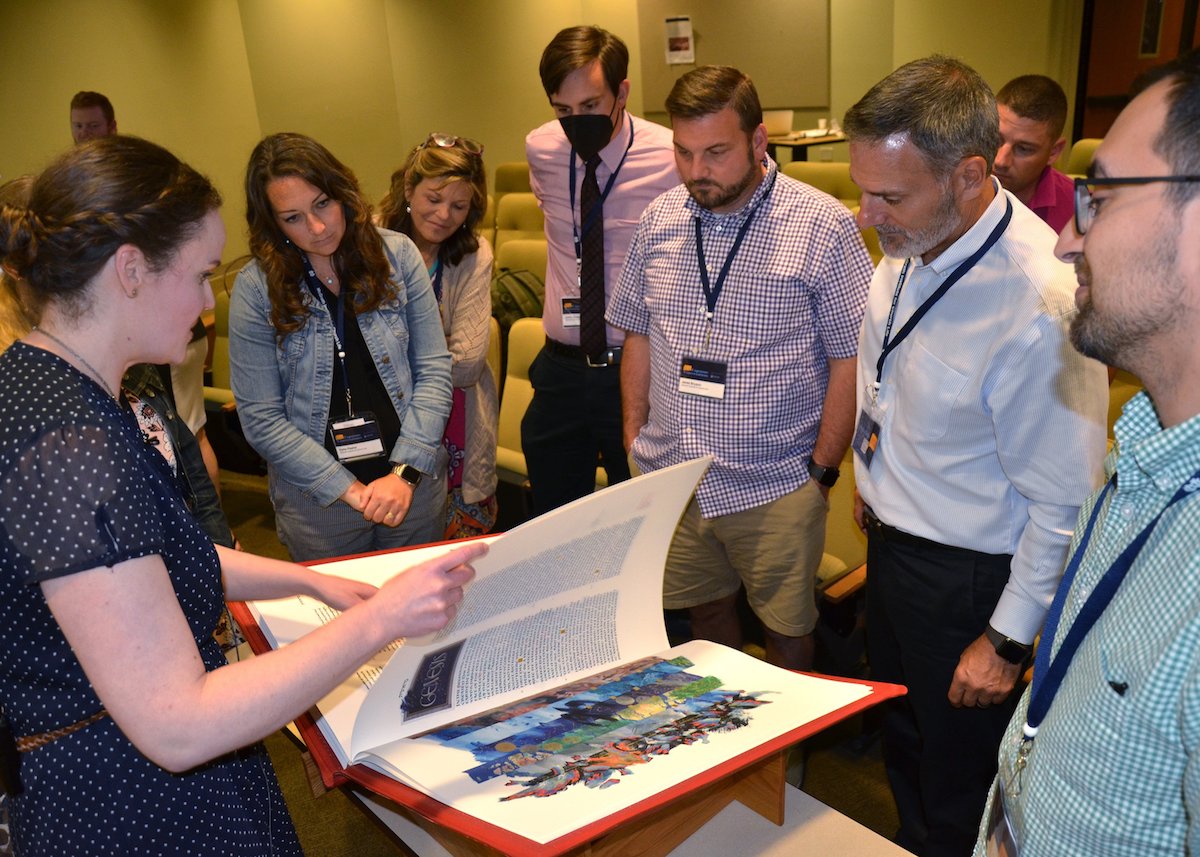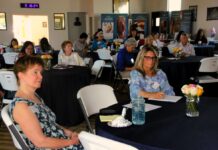SOUTH BEND, Ind. (CNS) — The McGrath Institute for Church Life’s Church Communications Ecology Program recently welcomed its inaugural cohort to the University of Notre Dame for an Evangelization and Media Symposium to address the impact of social media and digital technologies on the life of the Catholic Church.
The event welcomed church leaders from nine U.S. dioceses along with over two dozen graduate students taking an “Evangelization and Media” course at Notre Dame.
The program’s inaugural cohort included pastors, communication directors, lay ministers and seminarians. The course and program are led by Brett Robinson, director of Catholic media studies at the McGrath Institute.
“The event was designed to give Catholic lay and religious leaders an opportunity to discuss the effects of digital culture on their leadership and ministry,” said Robinson. “Social media, the internet and smartphones have had a profound impact on human relationships, families and community life.
“To understand these changes in the media environment is to understand the dramatic cultural shifts of the last two decades.”
The program participants discussed strategies for dealing with technological and cultural change in ways that support the social and spiritual health of faith communities.
From individual practices of fasting from technology on Fridays to parish-level initiatives focused on leveraging the benefits of technology to strengthen local support networks, the range of proposals echoed the teaching of Pope Francis and the church on the balance necessary for using technology virtuously.
Pope Francis has frequently commented on the promise and pitfalls of today’s information environment, noting that as people become more connected digitally, they risk losing the ability to engage in authentic encounters with others.
The essential link between communication, community and communion with one another and God has been a persistent theme in the church’s teaching.
An evening keynote address from Father John Wauck, of Rome’s Pontifical University of the Holy Cross, titled “Analog Hunger: Art in an Age of Alienation” explored the ways in which literature helps us come to grips with the sense of alienation that the modern world creates.
By diagnosing the cultural conditions that lead to alienation, Catholic authors such as Walker Percy and Flannery O’Connor offer images for reconnecting to the mystery of being human, he said.
During the day, the program’s cohort members presented proposals for integrating social media and digital technology with ministry efforts in ways that amplify the positive potential of the technology and mitigate the negative effects.
Deacon Matthew Kuna, a seminarian from the Diocese of Allentown, Pennsylvania, offered advice for dealing with the effects of divisive social media rhetoric on local parish communities.
Vincent Reilly from St. Catherine’s Parish in Orange Park, Florida, emphasized the importance of human presence for effective evangelization in the virtual age.
“The Catholic faith is an incarnate faith. The Word was made flesh,” added Robinson. “All of our presenters focused on the power of authentic forms of human communication for building strong communities in an increasingly fragmented world.”
Another keynote address, “Technology and Neuroception: Evangelizing Opportunities to Shape the Cogitative Power” — delivered by Dominican Father Ezra Sullivan, of Rome’s Pontifical University of St. Thomas Aquinas — helped the students and church leaders understand the neuroscience behind our habits and perception and how technology can shape them for good or ill.
The event concluded with a staged conversation between German theologian Father Romano Guardini and media theorist Marshall McLuhan.
Performed by Marshall’s grandson Andrew McLuhan, proprietor of The McLuhan Institute, and Peter Berkman, a research fellow at the Center for the Study of Digital Life, the conversation focused on the various overlaps between Father Guardini and McLuhan in their written work on technology, culture and the church.
Participants also attended several sessions illustrating the role of different media in the history of the church including medieval manuscripts, stained-glass windows, and the use of online tools for streaming worship services and convening prayer groups.
The Church Communications Ecology Program, or CCEP, is a six-month educational formation program made possible by a $1 million grant from the Lilly Endowment that examines the ways that digital media is changing social, political, economic and religious life and what those changes mean for building thriving parish communities.
Prior to the capstone event, the CCEP participants completed a six-week online course with theology, philosophy, and communications faculty from Notre Dame, Duquesne University and Mount St. Mary’s University before receiving three months of coaching and mentoring that integrated insights from the course with local pastoral priorities.
The mid-June gathering at Notre Dame gave leaders the opportunity to share their “transformational ideas” with CCEP colleagues, faculty and graduate students in Notre Dame’s master of arts program in theology.







